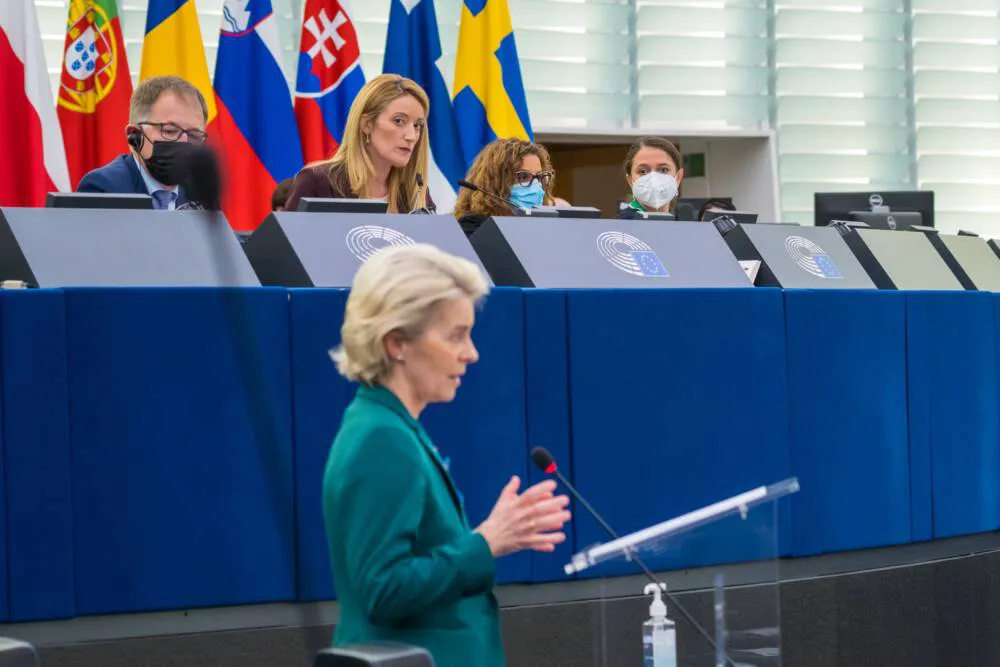The European Commission positively assessed the National Reconstruction Plan for Poland. This is an important step towards the EU disbursement of EUR 23,9 billion in grants and EUR 11,5 billion in loans under the Facility for Reconstruction and Resilience (RRF). This funding will support the implementation of the key investment and reform measures outlined in the Polish Economic Recovery and Resilience Plan. It will enable Poland to emerge stronger from the COVID-19 pandemic and progress in green and digital transformation.
for EUR 35,4 billion
The RRF is a key instrument that will provide up to EUR 800 billion to support investment and reform across the EU. The Polish KPO is part of the unprecedented and coordinated EU response to the COVID-19 crisis. It aims to meet common European challenges by addressing green and digital transformations, strengthening economic and social resilience and the cohesion of the single market.
The Commission assessed the Poland plan on the basis of the criteria set out in the RRF Regulation. The Commission's analysis focused in particular on whether the investments and reforms included in the Polish plan are supporting the ecological and digital transformation; contribute to effectively tackling the challenges identified in the European Semester; and strengthen its growth potential, job creation and economic and social resilience.
The Polish plan contains milestones related to important aspects of the independence of the judiciary which are of particular importance for improving the investment climate and creating the conditions for the successful implementation of the Recovery and Resilience Plan. Poland must demonstrate that these milestones have been achieved before making any RRF disbursements.
Securing the green and digital transformation of Poland
The Commission's assessment shows that the Polish plan allocates 42,7% of the total allocation to activities supporting climate goals. It is expected that the implementation of the Polish plan will significantly contribute to the decarbonisation of the Polish economy. First of all, by increasing the share of renewable energy in the energy mix, the energy efficiency of the economy and the independence of energy supplies to Poland. This includes significant funding for offshore wind farms, as well as key changes to the regulatory framework to facilitate the construction of offshore and onshore wind farms. In addition, the implementation of the plan is to support energy-efficient renovation of buildings, modernization of rail and bus transport. Also through road safety and the development of green hydrogen technologies.
The Commission states that the Polish plan allocates 21,3% of the total allocation to activities supporting digital transformation. This includes investments to ensure universal access to high-speed internet, digitization of public services. Also through IT equipment for schools, digital skills and cybersecurity.
Strengthening the economic and social resilience of Poland
The commission believes the plan Poland includes a comprehensive set of mutually reinforcing reforms and investments. They contribute to effectively solving all or a significant part of the economic and social challenges outlined in the country-specific recommendations addressed to Poland.
The Polish plan includes several reforms aimed at improving the investment climate in Poland. This includes a comprehensive reform of the disciplinary regime applicable to Polish judges to strengthen important aspects of the independence of the judiciary.
Such a reform will have to fulfill the following obligations:
- All disciplinary cases against judges will be decided by a court other than the current Disciplinary Chamber. By a court that complies with the requirements of EU law, in line with the case law of the Court of Justice, and therefore is independent, impartial and established by law;
- Judges cannot be held disciplinary liable for referring a request for a preliminary ruling to the Court of Justice, for the content of their rulings or for checking whether another court is independent, impartial and established by law;
- The procedural rights of the parties in disciplinary proceedings are being strengthened;
- All judges who have been dealt with by decisions of the Disciplinary Chamber in the past will have the right to have these judgments reviewed without delay by a court that meets EU requirements and is therefore independent, impartial and established by law.
The Polish plan also includes reforms and investments towards a more accessible and effective healthcare system. It supports the modernization of vocational education, training and lifelong learning. All this to ensure that you have the right skills needed to integrate into the labor market. The various actions of the plan are aimed at improving the functioning of the labor market. Also, a reform of the personal income tax to encourage employees who have reached the statutory retirement age to continue working. Other measures are aimed at increasing labor force participation, including by women. These include reforms and investments in public employment services, long-term care and early childhood education and care.
The plan is a comprehensive and properly balanced response to the economic and social situation in Poland. Thus, it fits well with all six pillars of the RRF.
Supporting flagship investment and reform projects
The Polish plan proposes projects in all six European flagship areas. These are specific investment projects that deal with problems common to all EU Member States. This applies to problems in the areas of job creation and economic growth that are needed for green and digital transformation.
For example, an investment in the green transformation of cities worth EUR 2,8 billion will support the deployment of renewable energy sources and the development of clean and sustainable transport. The plan also includes significant investment in ensuring high-speed Internet access in areas without broadband connectivity.
The Commission's assessment also concluded that none of the measures contained in the plan cause any significant harm to the environment, as required by the RRF Regulation.
The Commission considers that the control systems put in place by Poland are adequate to protect the financial interests of the Union following the implementation of the milestones for the additional audit and control measures set out in the Commission's proposal for a Council Implementing Decision. They concern milestones related to the strengthening of certain aspects of the independence of the Polish judiciary, mentioned above. It also applies to the use of the Arachne IT tool. It is a tool that supports Member States in their anti-fraud activities by enabling them to collect data on final recipients of funds, contractors, subcontractors and beneficial owners and make it available on request. The plan contains sufficient details on how national authorities will prevent conflicts of interest, corruption and fraud related to the use of the funds.
The head of the European Commission will present details during a special conference with President Andrzej Duda and Prime Minister Mateusz Morawiecki. This conference is scheduled for today at 17.25:XNUMX pm.
Source: European Commission
Read and learn more: Activities of the Polish-language information portal wataha.no in Norway and Wataha Integrasjon Forening




